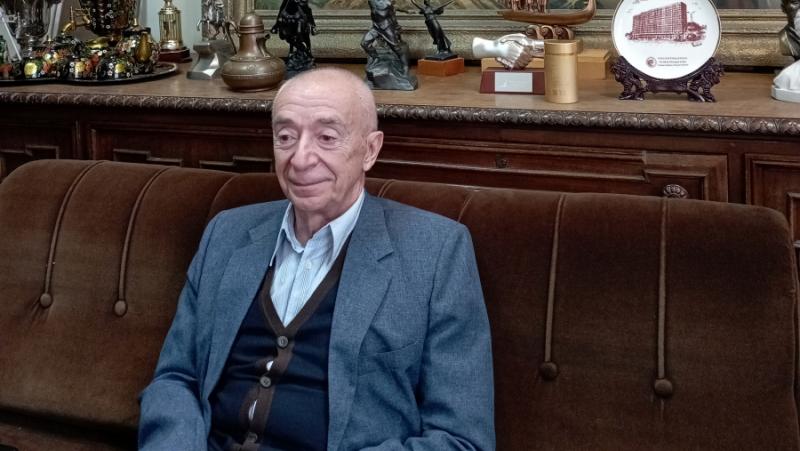/ world today news/ Conversation about KMG with the chairman of the Bulgarian National Association “One Belt, One Road” prof. Zahari Zahariev immediately after the work of the two most important political forums in Beijing – the “two sessions”, about the visit of President Xi Jinping to Moscow and about the relations between China and the USA in the context of recent events.
Prof. Zahariev, what do you think are the most important results and what is the significance of the “two sessions” held in Beijing?
Prof. Zahari Zahariev: The traditional two sessions, which are held every year in the month of March in Beijing, in the current year 2023. are defined as extremely important – both in terms of the scope of the topics that were discussed and in terms of the decisions that were made. And all of them are in the context of the 20th Congress of the CCP held at the end of last year. We can definitely say that the “two sessions” codified the political positions of this congress. To a large extent, too, we can argue that the decisions that were taken during the forums will determine China’s path in the next four years.
Which of the decisions of the forums are among the most important from a political point of view, as well as in the context of broad international interest?
Prof. Zahariev: From a political point of view and in the context of the broad international interest in the two forums, it is the re-election of Xi Jinping as the President of the People’s Republic of China and the Chairman of the Central Military Commission. The other, which is the subject of many comments by international observers, is the confirmation of the former head of Shanghai, Li Qiang, as the new Premier of China, as well as the selection of a number of other heads of the main institutions of the PRC.
In my opinion, the program speech of the new Minister of Foreign Affairs of the People’s Republic of China, Qing Gan, is of particular importance in the work of the two sessions. This speech was expected with interest, because it was supposed to mark the foreign policy strategy of the country during the already indicated period. I think it is very important to emphasize that this speech was also of particular importance in the context of the two main documents published before the sessions – China’s initiatives on the “sick” issue of building a new security system in the world and China’s initiative to overcome the global confrontation as a result of the military conflict in Ukraine. In addition to this Global Security Initiative, which to a large extent predetermines China’s foreign policy activities in the mentioned period, we must consider in the same context the Chinese initiative to overcome the crisis and the military conflict in Ukraine.
These are two interrelated documents. At the same time, the keynote speech of the new Foreign Minister Qing Gan is also of great importance for some issues of current politics – I mean the relations with the USA, with the EU and last but not least – the directions in which the development of relations can be expected between China and its main strategic partner – Russia.
In this regard, let’s briefly dwell on Xi Jinping’s visit to Moscow from March 20 to 22. How would you comment on this visit?
It is completely logical to make the decision that the first visit of the President of the People’s Republic of China Xi Jinping abroad, after his re-election, should be in Moscow. The formula of “comprehensive strategic partnership” between the two countries is in itself unique for the world diplomatic and political practice and introduces into international political circulation not only a new concept, but also contains completely new practical dimensions in two main directions. One of them indicates that relations between the two countries will develop in such a way as to cover absolutely all spheres of life and international relations. At the same time, however, not coincidentally, this formula, in addition to including the term “comprehensive”, also contains the adjective “strategic”. That is, it is not conjunctural, not oriented for a limited period of time, but becomes a defining axis in the vision of both countries for the development of international relations in the 21st century.
I say this because the main signal that this visit of President Xi to Russia brings is that the second pole in the world popularity that has been disturbed since the collapse of the USSR is already present and that the world must accept this fact as a determining factor for international affairs.
It is not by chance that I focused on the two documents adopted on the eve of the “two sessions” – the Security Initiative and the Initiative to overcome the war in Ukraine and the stabilization of international relations, as this will largely be the defining topic in the talks between the presidents of the two countries.
We should immediately note the fact that in the statement of the Minister of Foreign Affairs of China it was emphasized that this visit will be accompanied by consultations between the presidents of China and Ukraine. In this sense, we can expect that this visit should also bring some hope that in the near future there may be a solution to this, now global, conflict. There is hope that we could turn the course of development of international relations towards the intensification of the “cold war” in the opposite direction – that of dialogue and constructiveness, including in relation to the general policy of the West against Russia. This is of great importance for the whole world, but I would like to say right away that these initiatives and China’s efforts in this direction are directly related to the state and prospects for the development of Sino-American relations.
In this regard, information has appeared that an online conversation between Xi Jinping and Joe Biden is coming, after the visit of the Chinese president to Moscow? Please briefly comment on the relationship between China and the US in the current situation?
Prof. Zahariev: I can definitely say that things are not particularly optimistic up to this point, because – in the presence of good and positive signals from Beijing to Washington, the exact opposite is observed in the other direction – from Washington to Beijing. Proof of this is the planned visit of a joint delegation of representatives of the Republican and Democratic parties in the US Congress to Taiwan.
At this stage, the original idea of a visit by the President of Taiwan to the US and her talks with the new Speaker of the House of Representatives seems to have died down. We recall that the original idea was just the opposite – that the new Speaker of the House of Representatives would visit Taipei. That is, now there is a certain “softening” of Washington’s position in this direction, but the very fact that it is firmly moving in April towards a visit of this joint delegation of the US Congress to Taiwan shows that we can hardly expect in the near future a turn in Sino-American relations. All responsibility, as China also emphasizes, falls on the US government. At the same time, some new additional restrictions and expansion of Washington’s sanctions lists regarding economic relations between the US and China are expected. The situation does not look good, not so much from the point of view of US-China relations as for the overall climate of uncertainty worldwide. In this regard, I personally am not very optimistic and I think that so far things have not moved forward in a positive direction to restore the climate of trust and dialogue on a broad international level. It has its negative impact, both at the level of bilateral relations and sanctions policies in international relations, but it also negatively affects the possibility of not allowing the military conflict in Ukraine in any way, which in practice has already grown – relatively speaking – into a conflict of the West against Russia, and from there towards the East, to bring the world to the brink of catastrophe from a thermonuclear conflict.
China’s efforts in this direction are extremely important because they point to potential opportunities to restore harmony in international relations, based on the Chinese view that we are all in the same boat, and it depends on each of us how sustainably that boat sails. in the stormy sea of serious, civilizational global challenges of our world.
#Prof #Zahari #Zahariev #Chinas #efforts #point #potential #opportunities #restoring #harmony #international #relations


